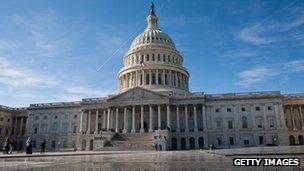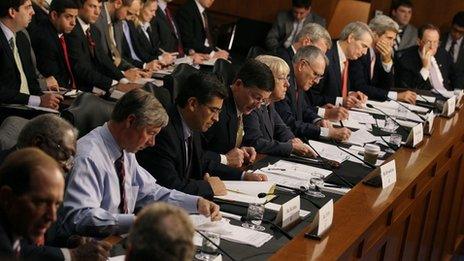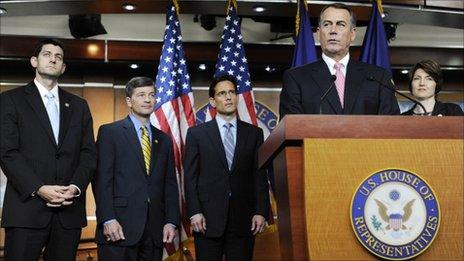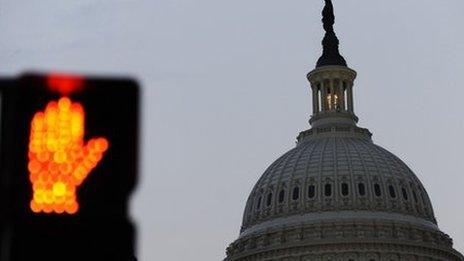Super-committee failure was not supposed to happen
- Published
- comments

Congress is heading for another missed deadline
The super-committee, specially designed to avoid failure, is on the brink of it, external nonetheless.
Congress is about to flunk another test of relevance.
It is heading for another missed deadline, another absence of agreement, another example of fecklessness for those who like to shake their heads in despair over Washington politics.
There is a growing mood in America that the political system has been broken by men and women putting party politics before the national interest.
The USA is $15tn (£9.5tn) in debt, external and most of the country, including its politicians, see this as an urgent problem. But it is apparently not so urgent that Republicans and Democrats can find a way to agree on how to achieve just over a trillion dollars of cuts.
President Barack Obama and Congress agreed together that there had to be a special solution to a special problem, external.
The debt was, they seemed to say, a political test too big to fail. So a special mechanism was set up, specifically designed to avoid the normal partisan bickering and lack of seriousness about reaching a solution.
'Devastating'
The idea was on the lines of simple game theory. With the clock running, two antagonists must reach an agreement or, when midnight strikes, they are both tipped into a tank of piranhas. Death by a thousand cuts. A fate so horrific they would be forced to agree.
In this case, failure this week would trigger automatic cuts, external (know as "sequestration").
Defence cuts so deep that the Republicans will howl, and which the defence secretary has warned, external would be "devastating".
Cuts to education, housing and public health programmes that Democrats wouldn't relish, although the pain is not so great for them.
The failure of a system specifically designed to force agreement would dramatically underscore the magnitude of the problem.
That is the theory, at any rate. Not everyone agrees. Many of the left blame Grover Norquist, external for the impasse. They say the libertarian crusader has put Republicans in Congress in an impossible position by getting them to sign a solemn pledge against putting up any and all taxes, external.
I get the impression that Mr Norquist, with his deadpan delivery and an impish sense of humour, delights in being the bete noire of the liberal establishment.
He tells me that there is no gridlock. He says that is just Democratspeak for failure to get their way over putting up taxes. If there's "failure", that's fine by him. There will be spending cuts, and no tax increases.
He thinks the defence department can find plenty to trim without putting the nation at risk. He says that if President Obama wants to give up smoking, there's no point buying him just one more carton of cigarettes. If he wants to stop spending, then there is no point in giving him more taxes.
So some economic conservatives, some in the Tea Party may see Washington's failure as their success.
But the markets and most voters are unlikely to share this sanguine view. This is about the way America sees Washington and the world sees politicians.
'Less predictable'
It is worth remembering that after the long, drawn-out budget crisis, Standard and Poor's downgraded the USA's credit rating, external.
But they did it not because the country was left without a budget for a while, but because it suggested - in their own words - that "governance and policymaking [is] becoming less stable, less effective, and less predictable". The markets may have already discounted the possibility of success. That is not great news.
What is happening here echoes the tribulations of much less robust systems in Europe.
In Italy, they've decided that politics is too serious a business to be left to politicians and the technocrats have taken over, in a cabinet where the PM is an economist, an admiral is defence secretary and the country's top banker is in charge of development and transport.
Think of a legal coup d'etat replacing Congress with Paul Krugman, external, Mike Mullen, external and Vikram Pandit, external.
The Italian job has been widely praised but it has its dangers. The politicians are not trusted because they are hamstrung by worries about what the voters will think of their actions. That's what democracy is all about.
It is healthy in democracies that people have a certain degree of cynicism and indeed a degree of contempt for their elected representatives.
It is not so good if they are seen as a luxury to be jettisoned in times of austerity. Yet the politicians on the Hill seem determined to confirm that they are the problem, not the solution.
- Published13 November 2011

- Published10 August 2011

- Published6 August 2011
